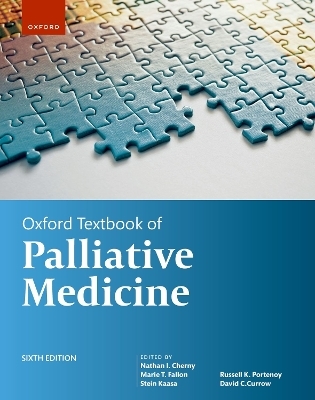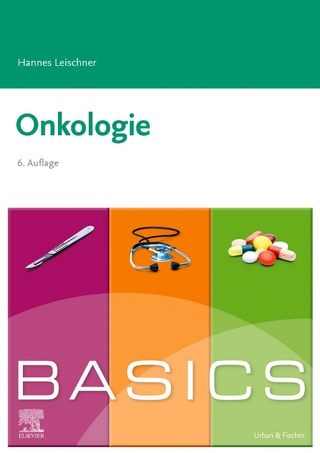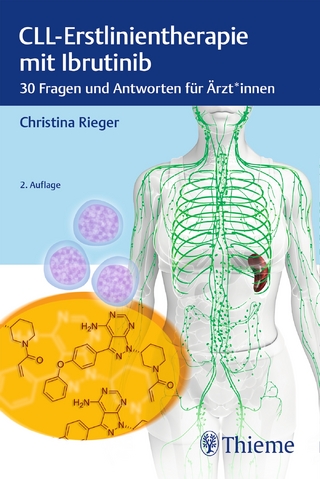
Oxford Textbook of Palliative Medicine
Oxford University Press (Verlag)
978-0-19-890059-7 (ISBN)
This sixth edition of the Oxford Textbook of Palliative Medicine takes us now into the third decade for this definitive award-winning textbook. It has been rigorously updated to offer a truly global perspective, highlighting the best current evidence-based practices, and collective wisdom from more than 200 experts around the world.
This leading textbook covers all the new and emerging topics, updated and restructured to reflect major developments in the increasingly widespread acceptance of palliative medicine as a fundamental public health need. The sixth edition includes new sections devoted to family and caregiver issues, cardio-respiratory symptoms and disorders, and genitourinary symptoms and disorders. In addition, the multi-disciplinary nature of palliative care is emphasized throughout the textbook, covering areas from ethical and communication issues, the treatment of symptoms, and the management of pain.
The Oxford Textbook of Palliative Medicine is a truly comprehensive text. No hospital, hospice, palliative care service, or medical library should be without this essential source of information.
This sixth edition of the Oxford Textbook of Palliative Medicine is dedicated to the memory of Professor Kenneth Fearon husband of Professor Marie Fallon and a surgeon who became a world leader in the research and management of anorexia and cachexia. He modeled a work-life balance that is so critical in our field, with devotion to both his patients and his family.
Nathan I. Cherny is Norman Levan Chair of Humanistic Medicine at Shaare Zedek Medical Center and Associate Professor of Medicine at Ben Gurion University, Israel. In 2015 he was awarded the ESMO (European Society of Medical Oncology) Award for his contributions to the development of oncology in Europe, and in 2016 was the recipient of the EAPC/EJPC (European Association of Palliative Care/ European Journal of Palliative Care) Palliative Care Policy Development Award. Nathan has diverse research interests including opioid responsiveness of neuropathic pain, opioid rotation, opioid side effects and their management, cancer pain syndromes, suffering, palliative sedation, communication issues in oncology and palliative care, bioethics, and public health. He teaches in the Hebrew University Medical School and runs courses in communication and palliative medicine. Nathan has edited five books and has published over 120 peer reviewed papers and has made numerous invited lectures worldwide. Marie T. Fallon is the St Columba's Hospice Chair of Palliative Medicine at the University of Edinburgh, Honorary Consultant in Palliative Care at the Western General Hospital in Edinburgh and leads the Edinburgh Palliative and Supportive Care group (EpaS). Marie serves as Chief Investigator for EpaS on a large portfolio of clinical studies spanning investigator-led randomized controlled trials examining improved management of cancer-induced bone pain, neuropathic pain, and institutionalisation of pain assessment. Marie is also the lead in an international programme of RCTs in cannabinoids in cancer-related pain and has led the development of studies using fMRI in Edinburgh, UK. Stein Kaasa is Professor of Palliative Medicine at the Institute of Cancer Research and Molecular Medicine at the Norwegian University of Science and Technology (NTNU), Norway. Stein specialises in medical oncology, radiotherapy, and palliative medicine. In 1993, he was appointed as the first professor in palliative medicine in Scandinavia and he was one of the founders of the palliative care unit in Trondheim and founder of the European Palliative Care Research Centre (PRC). He has been president of EAPC, the coordinator for a large EU-funded project, and is at present involved in several research collaborative and international partnerships on research and policy development. Stein has been an important advocate for evidence-based practice and has worked extensively to get palliative care research on the global agenda. Stein is also Director of the PRC and Chair of the European Association for Palliative Care Research Network and has published more than 450 articles and book chapters. Russell K. Portenoy is Executive Director and Chief Medical Officer of the MJHS Institute for Innovation in Palliative Care and is Professor of Neurology and Family and Social Medicine at the Albert Einstein College of Medicine, New York. Prior to joining MJHS, he was founding Chairman of the Department of Pain Medicine and Palliative Care and the Gerald J. Friedman Chair in Pain Medicine and Palliative Care at Mount Sinai Beth Israel Medical Center. Russell is Past President of both the American Academy of Hospice and Palliative Medicine and the American Pain Society. He previously chaired the American Board of Hospice and Palliative Medicine. Russell is recipient of the Lifetime Achievement Award, the National Leadership Award of the American Academy of Hospice and Palliative Medicine, the Wilbert Fordyce Award for Lifetime Excellence in Clinical Investigation, the Distinguished Service Award from the American Pain Society, and the Founder's Award by the American Academy of Pain Medicine. David C. Currow is Professor of Palliative Medicine at University of Technology Sydney, the Matthew Flinders Distinguished Professor of Palliative and Supportive Care, Flinders University and Associate Director (Research) at the Wolfson Palliative Care Research Centre, University of Hull, UK. Research includes clinical trials and use of large datasets to understand better the impact of life-limiting illnesses on patients and caregivers. Research into chronic breathlessness is a particular area of interest. He is the principal investigator for the Australian national Palliative Care Clinical Studies Collaborative (PaCCSC) and is a foundation partner in the Australian national Palliative Care Outcomes Collaborative (PCOC), an initiative to improve palliative care clinical outcomes through point-of-care data collection.
Section 1: The worldwide status of palliative care
1.1: Carlos Centeno, Sheila Payne, and Eduardo Garralda: International progress in the development of palliative care
1.2: Lukas Radbruch and Liliana De Lima: Essential medicines for palliative care
1.3: Frank Brennan and Liz Gwyther: Human rights issues
1.4: Stephen R. Connor: Policy in palliative care
Section 2: The challenge of palliative medicine
2.1: Russell K. Portenoy: Building definitional consensus in palliative care
2.2: Nathan I. Cherny and Russell K. Portenoy: Core concepts in palliative care
2.3: Davinia Seah, David Marco, Jennifer Philip, and Megan B. Sands: The epidemiology of death and symptoms: planning for population-based palliative care
2.4: Barry Laird, Erna Haraldsdottir, and Charlie Hall: Barriers to the delivery of palliative care
2.5: Jonathan Koffman and Natalia Calanzani: Ethnic and cultural aspects of palliative and end of life care
2.6: Peter S. Hall, Katharina Diernberger, and Liz Grant: Health economics for palliative care
Section 3: Service delivery issues in palliative care
3.1: Breffni Hannon, Stein Kaasa, and Camilla Zimmermann: Specialist palliative care along the trajectory of illness: issues in the early integration of palliative care
3.2: Irene J. Higginson: Palliative care delivery models
3.3: Sharon Einav, Nathan I. Cherny, and J. Randall Curtis: Palliative medicine in the intensive care unit
3.4: Naomi George and Corita Grudzen: Palliative care in the emergency department
3.5: Jane Phillips and Annmarie Hosie: Palliative care in the nursing home
Section 4: Healthcare professionals in palliative care
4.1: Dagny Faksvåg Haugen, Friedemann Nauck, and Deborah Witt Sherman: The core team and the extended team
4.2: Nathan I. Cherny, Batsheva Werman, and Michael Kearney: Burnout, compassion fatigue, and moral distress in palliative care
4.3: Betty R. Ferrell, Polly Mazanec, Pam Malloy, and Rose Virani: Nursing Education in palliative care
4.4: Terry Altilio, Bridget Sumser, and Nina Laing: Social work in palliative care
4.5: George Handzo and Christina Puchalski: The role of the chaplain in palliative care
4.6: Maria Denise Pessoa Silva, Fiona Rolls, Lynne White, Tamsin Longley, Jane Murphy, and Jill Cooper: Occupational therapy in palliative care
4.7: Nigel Hartley: The role of the creative arts in palliative care
4.8: Samantha Cushen and Aoife Ryan: The role of the dietitian in palliative care
4.9: Lucy Fettes and Matthew Maddocks: Physiotherapy in palliative care
4.10: Tim Luckett and Katherine L.P. Reid: Speech and language therapy in palliative care
4.11: E. Alessandra Strada: Clinical psychology in palliative care
4.12: Ebtesam Ahmed: The contribution of the clinical pharmacist in palliative care
4.13: Andrew M. Cole: Medical rehabilitation and the palliative care patient
Section 5: Communication and palliative medicine
5.1: Thomas W. LeBlanc and James Tulsky: Communication with the patient and family
5.2: Susan D. Block: Practical considerations including difficult conversations
5.3: Judith Rietjens, Ida Korfage, and Jane Seymour: Advance care planning
Section 6: Family and caregiver issues
6.1: Carrie Lethborg and David W. Kissane: Family dynamics in the context of serious illness
6.2: Rinat Nissim, Sarah Hales, and Gary Rodin: Caregiver burden and distress
Section 7: Pain
7.1: Lucy N. Wyld, Clare Rayment, and Mike I. Bennett: Definition and assessment of chronic pain in advanced disease
7.2: Anthony H. Dickenson and Richard Gordon-Williams: Pathophysiology of pain in cancer and other terminal illnesses
7.3: Nathan I. Cherny: Acute cancer pain syndromes
7.4: Nathan I. Cherny: Chronic cancer pain syndromes
7.5: Ruth Miles, Steven Wanklyn, and Joy Ross: Principles of drug therapy
7.6: Nathan I. Cherny and Marie T. Fallon: Opioid therapy: optimizing analgesic outcomes
7.7: Joseph V. Pergolizzi, Jr., Jo Ann LeQuang, Flaminia Coluzzi, Dean Mariano, Andrew Nicolaou, and Christopher Gharibo: Opioid therapy: managing risks of abuse, addiction, and diversion
7.8: Per Sjøgren, Frank Elsner, and Stein Kaasa: Non-opioid analgesics
7.9: Russell K. Portenoy, Ebtesam Ahmed, and Mona Patel: Adjuvant analgesics: principles of use
7.10: Robert A. Swarm, Menelaos Karanikolas, Lesley K. Rao, and Rajiv K. Shah: Interventional approaches for chronic pain
7.11: Helena Knotkova: Neurostimulation in pain management
7.12: Joseph Winger, Carolyn E. Keeler, and Francis Keefe: Behavioral and psychosocial interventions for pain management
7.13: Noah Samuels and Eran Ben-Arye: Integrative medicine therapies in pain management
7.14: Peter Hoskin: Management issues in bone pain
7.15: Lise Ventzel and Nanna Finnerup: Management issues in neuropathic pain
7.16: Victor T. Chang: Management issues in visceral pain
7.17: Judith A. Paice: Management issues in chronic pain following cancer therapy
7.18: Renee McCulloch: Paediatric pain control
Section 8: Gastrointestinal symptoms and disorders
8.1: Katherine Clark: Dysphagia, dyspepsia, and hiccups
8.2: Saskie Dorman: Nausea and vomiting
8.3: Philip J. Larkin: Constipation and diarrhoea
8.4: Alexandra Shingina and Anne M. Larson: Jaundice, ascites, and encephalopathy
8.5: Vickie Baracos and Sharon M. Watanabe: Aetiology, classification, assessment, and treatment of the anorexia-cachexia syndrome
8.6: Jann Arends and Florian Strasser: Parenteral nutrition
Section 9: Cardio-respiratory symptoms and disorders
9.1: Miriam J. Johnson and David C. Currow: Breathlessness and other respiratory symptoms in palliative care
9.2: Doris Tse and Kin-Sang Chan: Cough and other pulmonary symptoms
Section 10: Skin and oral symptoms and disorders
10.1: Sebastian Probst and Georgina Gethin: Skin problems in palliative care
10.2: Charles P. Tilley, Mei R. Fu, Janet H. Van Cleave, Allison R. Most, and Christopher Comfort: Palliative wound and ostomy care
10.3: Vaughan Keeley: Lymphoedema and oedema of advanced disease
10.4: Andrew N. Davies: Oral care
Section 11: Genitourinary symptoms and disorders
11.1: Jennifer G. Rothschild, Noah E. Canvasser, Frederick J. Meyers, and Christopher Evans,: Dysuria, frequency, and bladder spasm
11.2: Noah E. Canvasser, Jennifer G. Rothschild, Frederick J. Meyers, and Christopher P. Evans: Obstructive urinary disorders
Section 12: Constitutional symptoms and related disorders
12.1: Sriram Yennurajalingam and Eduardo Bruera: Fatigue
12.2: Lauren Kadwell, Jane Ussher, Emilee Gilbert, Janette Perz, and Amanda Hordern: Sexuality in palliative care: discussing patient sexuality and intimacy in palliative care
12.3: Kyriaki Mystakidou, Efi Parpa, and Eleni Tsilika: Sleep disorders
12.4: Simon Noble, Nicola Pease, and Nicholas Chinn-Yee: Assessment and management of thrombotic complications
12.5: Bill Hulme, Sarah Wilcox, Paul Ashwood, Laura Deacon, Hazel Gilkes, and Victoria Montgomery: Assessment and management of bleeding complications in the medically ill
Section 13: Psychiatric and psychological symptoms and disorders
13.1: Tzeela Cohen and Simon Wein: Coping and resilience in palliative medicine
13.2: David W. Kissane: Depression, demoralization, and suicidality
13.3: Kerry A. Sherman and Christopher J. Kilby: Fear, anxiety, and adjustment disorder in palliative care
13.4: Meera Agar, Yesne Alici, Augusto Caraceni, and William Breitbart: Delirium
13.5: David W. Kissane: Bereavement
Section 14: Palliative care in cancer
14.1: Nathan I. Cherny and Stein Kaasa: The oncologist s role in delivering palliative care
14.2: Olav Dajani and Karin Jordan: Disease-modifying therapies in advanced cancer-medical treatment
14.3: Peter Hoskin: Radiotherapy in symptom management
14.4: Robert Krouse and Brian Badgwell: The role of general surgery in the palliative care of patients with cancer
14.5: Mohamed Yakoub and John Healey: Orthopaedic surgery in the palliation of cancer
14.6: Eran Ben-Arye and Noah Samuels: Integrative oncology in palliative medicine
14.7: Tarun Sabharwal, Nicos I. Fotiadis, and Andy Adam: Interventional radiology in the palliation of cancer
14.8: Augusto Caraceni, Fabio Simonetti, and Cinzia Martini: Neurological problems in advanced cancer
14.9: Richella Ryan and Ruth Casey: Endocrine and metabolic complications of advanced cancer
14.10: Jason W. Boland and Elaine G. Boland: Malignant Bowel obstruction
14.11: Catriona R. Mayland and Simon N. Rogers: Palliative care issues in head and neck cancers
14.12: Thomas W. LeBlanc and Arjee El-Jawahri: Palliative care issues in populations with haematological malignancies
14.13: Nancy Zhu and Cynthia Wu: Anaemia, cytopenias, and thrombosis in palliative medicine
Section 15: Issues in populations with non-cancer illnesses
15.1: Meera Pahuja and Peter Selwyn: HIV/AIDS
15.2: Natasha Smallwood and Nicole Goh: Advanced diseases of the lung
15.3: Steve Pantilat, Patricia Davidson, and Mitch Psotka: Advanced heart disease
15.4: Eric Widera, Shaida Talebreza, and Rachelle E. Bernacki: Dementia
15.5: Stefan Lorenzl and Raymond Voltz: Neurological disorders other than dementia
15.6: Arpan Patel and Anne Walling: Palliative care and end-stage liver disease
15.7: Fliss E.M. Murtagh: End-stage kidney disease
15.8: Anne Wilkinson and Marianne Matzo: Palliative care in catastrophic disasters and humanitarian crises
Section 16: Issues of the very young and the very old
16.1: Erna Haraldsdottir and Sally Paul: Involving children and families when someone important is dying or has died
16.2: Myra Bluebond-Langner, Richard W. Langner, and Ignasi Clemente: Care of children with advanced illness
16.3: Meera Agar and Jane Phillips: Palliative medicine and care of the elderly
Section 17: Spiritual issues in palliative medicine
17.1: Susan McClement, Genevieve Thompson, and Jamie Penner: Spiritual issues in palliative medicine
17.2: Yvan Beaussant, Alexandra Nichipor, and Tracy A. Balboni: Integration of spiritual care into palliative care service delivery models
Section 18: The terminal phase
18.1: Christian T. Sinclair: Predicting survival in patients with advanced disease
18.2: David Hui and Masanori Mori: Physiology of dying
18.3: Judith Lacey and Nathan I. Cherny: Management of the actively dying patient
Section 19: Ethical issues
19.1: Robert C. Macauley: Practical bioethics in the care of patients with advanced illness
19.2: Alexander A. Kon: Requests for futile or inappropriate interventions near the end of life
19.3: Nathan I. Cherny: Autonomy and shared decision making in a multi-cultural world
19.4: Linda Emanuel, Rebecca Johnson, and Lara Boyken: Truth-telling and consent
19.5: Richard D.W. Hain: Ethics in paediatric palliative care
19.6: Lars Johan Materstvedt: Ethical issues in physician aid-in-dying
19.7: Danielle Ko, Hannah Evans-Barns, and Craig Blinderman: Withholding and withdrawing life-sustaining treatment (including artificial nutrition and hydration)
19.8: Eric L. Krakauer: Medical and ethical considerations in palliative sedation at the end of life
Section 20: Assessment tools and Informatics
20.1: Afaf Girgis, Amy Waller, and Breanne Hobden: Palliative care needs assessment tools
20.2: Jennifer Tieman and David C. Currow: Informatics and literature search
20.3: Madeline Li, Tracy A. Balboni, Rinat Nissim, and Gary Rodin: Validated assessment tools for psychological, spiritual, and family issues
Section 21: Teaching and training in palliative medicine
21.1: Karen Forbes and Jane Gibbins: Physicians
21.2: Geana Paula Kurita and Philip J. Larkin: Nurses
21.3: Myra Glajchen, George Handzo, and Ebtesam Ahmed: Teaching and training in palliative social work, chaplaincy, and pharmacy
Section 22: Research in palliative medicine
22.1: Marianne J. Hjermstad and Stein Kaasa: Research in palliative care
22.2: Miriam J. Johnson and David C. Currow: The principles of evidence-based medicine
22.3: Pål Klepstad and Stein Kaasa: Understanding clinical trials in palliative care research
22.4: Kate Flemming: Qualitative research
22.5: David K. Kissane, Christopher H. Grossman, and Clare O'Callaghan: Research into psychosocial issues
22.6: Tyler Tate and David Casarett: Ethical issues in palliative care research
22.7: Jon Håvard Loge and Stein Kaasa: Quality of life and patient-reported outcome measures
22.8: Tinne Smets and Luc Deliens: Health services research in palliative and end-of-life care
22.9: Irene J. Higginson and Mevhibe B. Hocaoglu: Clinical audit in palliative medicine
| Erscheinungsdatum | 06.02.2024 |
|---|---|
| Reihe/Serie | Oxford Textbook |
| Verlagsort | Oxford |
| Sprache | englisch |
| Maße | 220 x 275 mm |
| Gewicht | 2982 g |
| Themenwelt | Medizin / Pharmazie ► Medizinische Fachgebiete ► Onkologie |
| Medizin / Pharmazie ► Medizinische Fachgebiete ► Palliativmedizin | |
| ISBN-10 | 0-19-890059-7 / 0198900597 |
| ISBN-13 | 978-0-19-890059-7 / 9780198900597 |
| Zustand | Neuware |
| Informationen gemäß Produktsicherheitsverordnung (GPSR) | |
| Haben Sie eine Frage zum Produkt? |
aus dem Bereich


